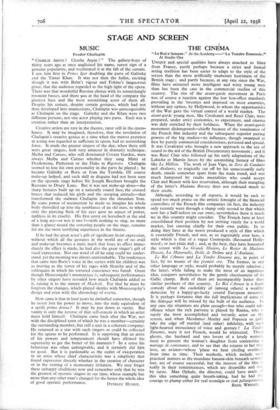THE CINEMA
"Le Roi s'Amuse." At the Academy—" La Tendre Emtemie." At Studio One
UNIQUE and . special qualities have always attached to films from France, partly perhaps because a strict and formal acting tradition has been easier to adapt to the style of the screen than the more artificially exuberant heartiness of the British stage ; and partly because, at any rate since the War, films have attracted more intelligent and witty young men than has been the case in the commercial studios of this country. The rise of the avant-garde movement in Paris was of course a reaction against the low box-office standards prevailing in the 'twenties and imposed on most countries, without any option, by Hollywood, to whom the opportunities of the War gave the virtual control of a world market. The avant-garde young men, like Cavalcanti and Rene Clair, were prepared, under strict economies, to experiment, and cinema was duly enriched by their boldness. When the avant-garde movement disintegrated—chiefly because of the renaissance of the French film industry and the subsequent superior paying powers of the big studios—its influence, though swamped at first by purely commercial considerations, persisted and spread. It was Cavalcanti who brought a new approach to the use of sound to the aid of the British Documentary movement ; and it was Rene Clair who followed up his early adaptations of the Labiche et Martin farces by the astonishing fantasy of films like Le Million. The work of Jean Vigo, in Zero de Conduite and Atalante, so tragically cut off by his unnecessarily early death, stands somewhat apart from the main trend, and was much hampered by studio mentalities who could accept Clair and Renoir with less reservation, although their mangling of the latter's Madame Bovary does not redound much to their credit.
Although, according to all reports, it would be rash to spend too much praise on the artistic foresight of the financial controllers of the French film companies (in fact, the industry only recently went through a slump only second to that which now has a half-nelson on our own), nevertheless there is much we in this country might consider. The French have at least consolidated their position by not striving vainly for a world market, but catering chiefly for their own public. In so doing they have at the worst produced a style of film which is essentially French, and not, as so regrettably over here, a style which is that of a vague Cosmopolis (flavoured Holly- wood), or just plain dull ; and, at the best, they have honoured the screen with La Grande Illusion, Le Rosier de Madame Husson, La Maternelle, Driile de Drdme and L'Atalante.
Le Roi s'Amuse and La Tendre Ennemie are, in point 01 fact, by no means of the premier cru. The former, in any other language or style, would probably be merely salacious ; the latter, while failing to make the most of an ingenious idea, conquers nevertheless by the gentle chastisement of its Gallic charip. Both of them are incomparably better than similar products of this country. Le Roi s'Aniuse is a frank comedy about the cuckoldry of (among others) a wealthy democrat by a happy-go-lucky central European monarch. It is perhaps fortunate that the full implications of some of the dialogue will be missed by the bulk of the audience. In any case the situations are plain enough—but who could take offence when the rich parvenu is played by Raimu, who i.; surely the most accomplished and versatile actor on the screen, and when Mesdames Morlay and Popescu so gaily take the edge off marital (and other) infidelity, with such light-hearted insouciance of voice and gesture ? La Tendrc Ennemie, were it not French, would be whimsical. Three ghosts, the husband and two lovers of a lovely woman, meet to prevent the woman's daughter from contracting a manage de conversance, and to see that she returns to her true love, an aviator—whose 'plane we hear circling overhea.1 from time to time. Their methods, which include such practical matters as the mundane banana-skin beneath unwary feet, are of course successful, but the interest of the film 1, really in their reminiscences, which are dreamlike and rea,. by turns. Max Ophuls, the director, could have made of this idea something quite breath-taking, had he had the courage to plump either for real nostalgia or real poltergeistercz.
BASIL WRIGHT.










































 Previous page
Previous page